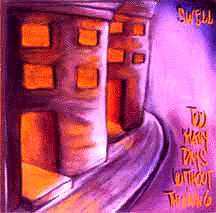
| |
|
Swell appeared out of San Francisco in 1990 with a self-released eponymous LP on their 'Psycho-Specific' label. It was intended at the time as a one-off record for the band, who fully expected to be split up within months of its release. But something happened. Blame the interest on fellow left-field American 'rock' artists American Music Club and Red House Painters at the time if you like, but 'Swell' received great plaudits, and won the group at least more than the handful of fans they maybe expected.
They followed the success of the eponymous LP with the much loved and lauded '...well?' LP (issued by the Mean label in the UK, who also issued the debut). Compared by some to the aforementioned American Music Club, it was a record that for others saw Swell take over the mantle of Eitzel's group by staying quirky and on the fringes of rock at a time when AMC seemed to be ploughing more of a trad Rock furrow. With the release of this record it became obvious that Swell had a very recognisable voice. David Freel's vocal was obviously a major part of this, but his guitar was similarly instantly stamped with a Swell signature (encompassed best, perhaps, on the great opening of 'At Long Last' - the blueprint for the best Swell sounds if ever there was). Things flowed, moved around on a groove supplied by Monte Vallier and distinctive drumming by Sean Kirkpatrick that was insistently shuffling, somehow hard and soft all at once. It sounded very Country, assuming your Country was inhabited by odd winos or slightly mumbling visionaries. In light of this it was fine to hear an extra quirk on '...well?' supplied by then 60 year old Richard McGhee, a wannabe night-club singer/entertainer. Marvellously strange.
They signed to American Records (released through Beggars Banquet in the UK) after this and there released the difficult third LP, '41'. This was their darkest record, a stripped down collection that nevertheless sounded denser than anything else. There were more acoustic guitars on this, and although it retained the trademark Swell sound, it was less easy to listen to. It was more threatening, bleaker than before, and in the light of the times it failed to make much of an impact. At a time when to be noticed you had to essentially be loud and stubbornly electric, Swell had gone quieter and more acoustic. In short, Swell were not rooted firmly enough in traditional rock mores to be easily marketed as a Big Rock Band, and perhaps lacked the contacts to put them on the map in the world of the American Underground Art movement gone global industry. Certainly they did not fit in. Whatever, American Recordings ditched the band and left them in the hinterland for a few years, where even old fans thought they had been true to the word of their initial intentions pre-'Swell' and had split for good.
Not so, however, as the release this March (or February if you're an American cousin...) on Beggars Banquet of their fourth LP proves. 'Too Many Days Without Thinking' shares a title with the one-off Sub-Pop 'Summer Songs' single, but a name is just about all that it has in common. This LP is the most easily accessible Swell record to date. It's cleaner, clearer, lighter in tone musically than the previous releases and has a foundation that takes the old easy shuffle and makes it harder and stronger without losing the surface texture that has always been important to the Swell sound. There's more of a feeling of inner strength in this record than ever before. More of a steeled gaze and a challenging set of mouth. It's the most confident sounding that Swell have ever been. David Freel has his guitar set to attack more often here, and he says 'fuck' more often than before. That's 'fuck' as in 'fucked up' and 'you'd better fucking believe it'. There's even a tune called 'Fuck Even Flow'.
Part of the cause of the changes may be down to production, here managed by the group in association with Kurt Ralske, ex of Ultra Vivid Scene and Crash infamy. There may certainly be a case to be put that the Ralske input has added the spaciousness that exists more obviously in the mix here than on other records. Not that Swell have not always been good at evoking space. All their records, and particularly '...well?', and now this new one, have been strong at evoking the feeling of movement through an environment, specifically a motorised movement. They work well as internal soundtracks to external travels, and vice versa as required.
So it's more of an obvious rock record than before, but it's still got its great Country folk roots. What they do best here and in the past is marry the acoustic and the electric with such ease and skill. It's the juxtapositions that they pull off which make them so cool, and it's partly this which makes the sound sashay in an atmosphere akin to those conjured by antipodean groups like the Jean Paul Sartre Experience or The Clean. They also show off that same knack for marrying some sweet melodies with bitter lyrics and darker noises.
It's a record, however, that still refuses to allow Swell to take up easy residency in any fashionable niche. As before, Swell are still neither traditional enough in approach to be embraced wholeheartedly by the Rock establishment, yet are probably not obviously experimental enough to be welcomed into any post-rock camp. This is a great shame, because Swell have at last made an LP that is both familiar enough to appeal to established fans, and commercial enough to be appreciated by newcomers. You'd be dumb to miss it, quite frankly.
Alistair Fitchett. Feb 1997. |
|